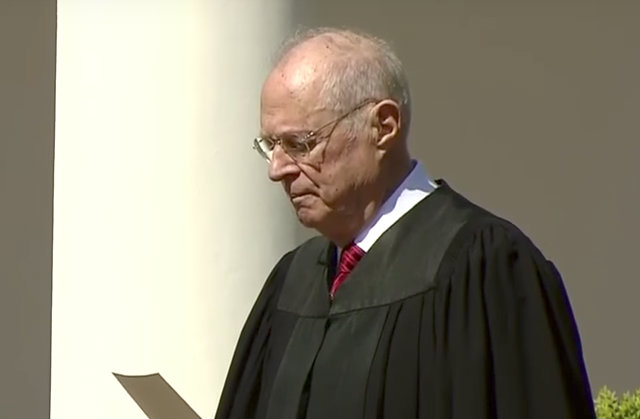
Justice Anthony Kennedy gave away some big clues today about Masterpiece Cakeshop during both sides’ oral arguments before the Supreme Court. But the only sure thing was Kennedy’s own confusion.
Justice Kennedy has been described by many SCOTUS watchers as the “pivotal” vote on the case at hand. A typically conservative Justice, Kennedy has distinguished himself by authoring–and providing the swing vote for–various landmark gay rights rulings issued by the nation’s highest court.
Masterpiece Cakeshop is not bound to be any different; the fate of the case very likely hinges upon Kennedy’s vote. And during today’s oral arguments, he sent a lot of signals–all of them mixed.
At one point, Kennedy came out strong against the idea of the Supreme Court paving the way for businesses to deny service in such a way as to be “an affront to the gay community.” Then Kennedy added that he believed the Colorado Civil Rights Commission has shown “hostility to religion,” which would seem to augur well for cake baker, Jack Phillips, who is against gay marriage.
Kennedy cited this comment from an unnamed commissioner:
I would also like to reiterate what we said in the hearing or the last meeting. Freedom of religion and religion has been used to justify all kinds of discrimination throughout history, whether it be slavery, whether it be the holocaust, whether it be — I mean, we — we can list hundreds of situations where freedom of religion has been used to justify discrimination. And to me it is one of the most despicable pieces of rhetoric that people can use to — to use their religion to hurt others.
At another point, Kennedy offered comments about tolerance, saying that it “is essential in a free society,” while adding the caveat that tolerance has to cut both ways. Kennedy’s both-sidesism was employed as the lead-in to additional comments suggesting Colorado has not been fair to Phillips. He said, “It seems to me that the state in its position here has been neither tolerant nor respectful of Mr. Phillips’ religious beliefs.”
Later, Kennedy seemed to dismiss the baker’s major legal argument altogether. As the Court went over the concept of government-compelled speech (which is an unconstitutional violation of the First Amendment), Kennedy was not particularly receptive of the argument that baking cakes amounted to speech in the first place.
Then, as Trump-appointed Solicitor General Noel Francisco finished up his argument in favor of Phillips, Kennedy asked Francisco what would happen if the court rules in favor of Phillips, and then bakers across the country are bombarded with requests not to provide cakes for gay weddings.
That question apparently tripped up Francisco, who said states might actually have a compelling interest in applying anti-discrimination laws to bakers like Phillips under such a scenario. This exchange looks like a point or two in favor of the gay couple denied the cake. But that’s not all.
At yet another point, Kennedy contested whether a gay couple’s dignity is actually being denied along with a denied cake request. This, of course, looks like a point in favor of Phillips. But again, there’s more contradictions coming.
Kennedy also swiped at one of Colorado’s major arguments: public accommodation laws. As part of the above-referenced tolerance exchange with Colorado Solicitor General Frederick R. Yarger, Kennedy said, “And — because accommodation is, quite possible, we assume there were other shops that — other good bakery shops that were available.”
That language reads a bit harsh for Colorado (and the gay couple), however, it’s not the sort of language Kennedy tends to use when he discusses constitutional rights. The ACLU’s Joshua Block noted, when discussing constitutional rights, “[Kennedy] talks about dignity, liberty, degrade.” Thus, Block concludes, the language employed in the tolerance exchange suggests Kennedy may issue a narrow concurrence devoid of constitutional precedent.
Then Kennedy argued with himself some more. While again discussing the ins-and-outs of the compelled speech argument, he said: “But the problem for you is that so many of these examples — and a photographer can be included — do involve speech. It means that there’s basically an ability to boycott gay marriages.” Such an outcome, obviously, would be unacceptable to pro-gay Kennedy and would therefore seem to tilt his hand in favor of Colorado.
But here, it’s best to err on the side of acknowledging that we just don’t know what Kennedy might do. If anything, his words in another gay rights case are perhaps the most instructive here. During oral arguments for Obergefell v. Hodges, while sparring with gay rights advocates, he said:
This definition [of traditional marriage] has been with us for millennia. And it’s very difficult for the court to say, ‘Oh, well, we know better.’
Kennedy later authored the opinion legalizing same-sex marriage in the United States.
Turns out he actually did know better.
[Screengrab via WJHL]
Follow Colin Kalmbacher on Twitter: @colinkalmbacher
Have a tip we should know? [email protected]